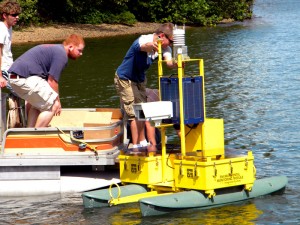
Students, faculty and other scientists at the Hancock Biological Station are busy using real time sensors to study the waters of the Kentucky Lake to better understand the water supply.
The Hancock Biological Station is located on the shores of Kentucky Lake and is a year-round facility providing scientists with a base operation for a wide variety of field research and presenting students with opportunities for field-oriented classes, individualized instruction, independent research and close interactions with researchers and faulty.
There are some students who choose to live at the station and conduct research as a contribution to their graduation requirements.
David White, director of Hancock Biological Stations, said the study of Kentucky Lake has been going on for the last 24 years and is the biggest project going on right now at the station.
White said since 19 percent of the world’s population does not receive clean drinking water on a daily basis, it is important to understand the closest water supply and not take it for granted.
“We are sort of water rich here,” he said. “But we need to understand our water here. We don’t think of how much water we use.”
White said researchers receive data from the sensors every six minutes and it provides with them with information about what is going on in the lake. They receive oxygen levels, algae levels, carbon levels, temperatures, etc.
The team receives 32 measurements from six different sensor spots located in various locations in the lake.
White said the basic service is offered to the general public and is used by the Weather Channel, Fort Campbell Military Base and the Kentucky Wildlife Society, just to name a few.
Kirk Raper, graduate student from Cookeville Tenn., said for the last three years he has been processing water chemistry samples for the Kentucky Lake project.
Raper said he wanted to be apart of this long-term research to better understand the changes of Kentucky Lake.
“I wanted to be involved with this project because I believe in its ability to provide useful information about our water resources, including how land practices may affect the water, and how variations over time can affect the lake’s ecology,” he said.
Raper said since 1988 the biological station has been gathering a suit of information regarding the physical, chemical and biological parameters of 16 different sites on the lake.
“The purpose of retrieving this long-term data is to be able to go back and observe the limnological status of the reservoir at any given time and to determine if any long-term changes maybe occurring in the chemistry and biology,” he said.
Raper said one of the more astounding observations the researchers have found is the introduction of the invasive water flea, Daphnia Lumholtzi, and the ecological changes following this event.
“Since we collect zooplankton samples with every cruise, we can look back at our database and see exactly what date in 1991, when we first detected the species, which is native to lakes in Africa, Asia and Australia,” he said.
Raper said since the Kentucky Lake is not a natural reservoir there are many questions about how it affects the ecosystems.
“We do know that reservoirs affect the environment by increasing sedimentation, altering physicochemical conditions and causing conditionally dependent species to sometimes become endangered or extinct,” he said. “This ongoing research provides data which can help explain some changes we have seen over the past 20 years and will continue to see into the future.”
The research raises awareness of the conditions and trends of the water resource at Kentucky Lake.
“If we were to notice extreme changes in data from the sites we collect from, we could investigate the reason and potentially take action if there was an unwarranted practice which could be compromising water quality,” Raper said.
Mike Young, assistant vice president of Student Affairs, said students can use the Hancock Station as an opportunity for a co-op or internship to gain undergraduate experience.
“I know that the station affords the students a more hands on opportunity to be involved in the experimental things they do out there,” Young said.